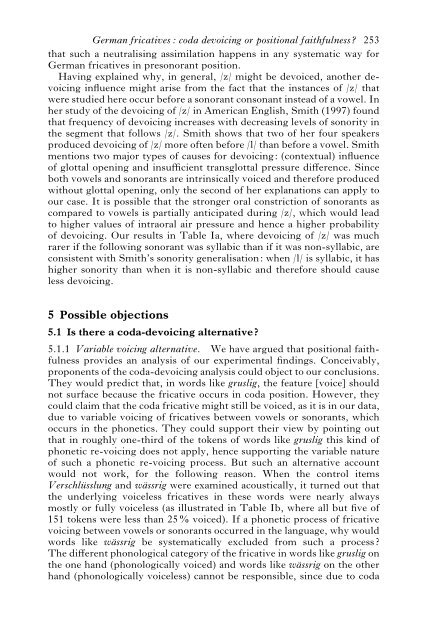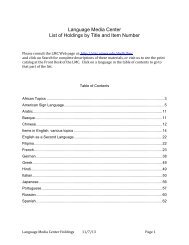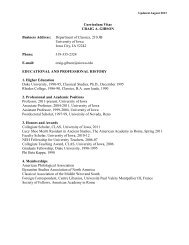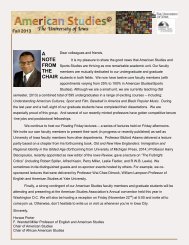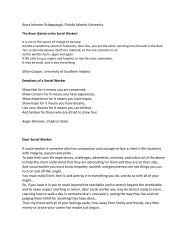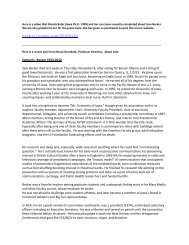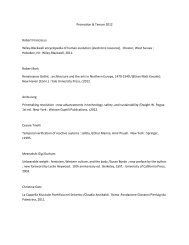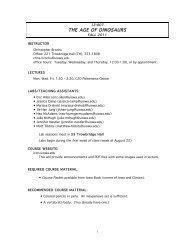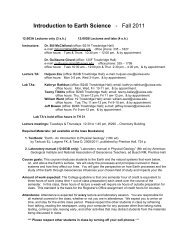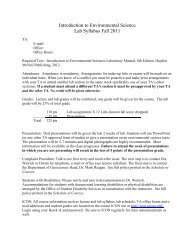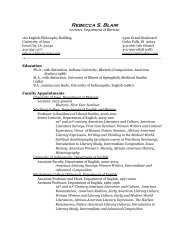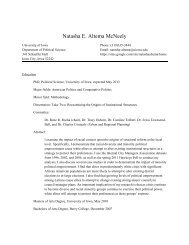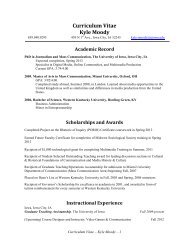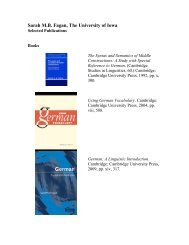German fricatives: coda devoicing or positional faithfulness?
German fricatives: coda devoicing or positional faithfulness?
German fricatives: coda devoicing or positional faithfulness?
You also want an ePaper? Increase the reach of your titles
YUMPU automatically turns print PDFs into web optimized ePapers that Google loves.
<strong>German</strong> <strong>fricatives</strong>: <strong>coda</strong> <strong>devoicing</strong> <strong>or</strong> <strong>positional</strong> <strong>faithfulness</strong>? 253<br />
that such a neutralising assimilation happens in any systematic way f<strong>or</strong><br />
<strong>German</strong> <strong>fricatives</strong> in preson<strong>or</strong>ant position.<br />
Having explained why, in general, /z/ might be devoiced, another <strong>devoicing</strong><br />
influence might arise from the fact that the instances of /z/ that<br />
were studied here occur bef<strong>or</strong>e a son<strong>or</strong>ant consonant instead of a vowel. In<br />
her study of the <strong>devoicing</strong> of /z/ in American English, Smith (1997) found<br />
that frequency of <strong>devoicing</strong> increases with decreasing levels of son<strong>or</strong>ity in<br />
the segment that follows /z/. Smith shows that two of her four speakers<br />
produced <strong>devoicing</strong> of /z/ m<strong>or</strong>e often bef<strong>or</strong>e /l/ than bef<strong>or</strong>e a vowel. Smith<br />
mentions two maj<strong>or</strong> types of causes f<strong>or</strong> <strong>devoicing</strong>: (contextual) influence<br />
of glottal opening and insufficient transglottal pressure difference. Since<br />
both vowels and son<strong>or</strong>ants are intrinsically voiced and theref<strong>or</strong>e produced<br />
without glottal opening, only the second of her explanations can apply to<br />
our case. It is possible that the stronger <strong>or</strong>al constriction of son<strong>or</strong>ants as<br />
compared to vowels is partially anticipated during /z/, which would lead<br />
to higher values of intra<strong>or</strong>al air pressure and hence a higher probability<br />
of <strong>devoicing</strong>. Our results in Table Ia, where <strong>devoicing</strong> of /z/ was much<br />
rarer if the following son<strong>or</strong>ant was syllabic than if it was non-syllabic, are<br />
consistent with Smith’s son<strong>or</strong>ity generalisation: when /l/ is syllabic, it has<br />
higher son<strong>or</strong>ity than when it is non-syllabic and theref<strong>or</strong>e should cause<br />
less <strong>devoicing</strong>.<br />
5 Possible objections<br />
5.1 Is there a <strong>coda</strong>-<strong>devoicing</strong> alternative?<br />
5.1.1 Variable voicing alternative. We have argued that <strong>positional</strong> <strong>faithfulness</strong><br />
provides an analysis of our experimental findings. Conceivably,<br />
proponents of the <strong>coda</strong>-<strong>devoicing</strong> analysis could object to our conclusions.<br />
They would predict that, in w<strong>or</strong>ds like gruslig, the feature [voice] should<br />
not surface because the fricative occurs in <strong>coda</strong> position. However, they<br />
could claim that the <strong>coda</strong> fricative might still be voiced, as it is in our data,<br />
due to variable voicing of <strong>fricatives</strong> between vowels <strong>or</strong> son<strong>or</strong>ants, which<br />
occurs in the phonetics. They could supp<strong>or</strong>t their view by pointing out<br />
that in roughly one-third of the tokens of w<strong>or</strong>ds like gruslig this kind of<br />
phonetic re-voicing does not apply, hence supp<strong>or</strong>ting the variable nature<br />
of such a phonetic re-voicing process. But such an alternative account<br />
would not w<strong>or</strong>k, f<strong>or</strong> the following reason. When the control items<br />
Verschlüsslung and wässrig were examined acoustically, it turned out that<br />
the underlying voiceless <strong>fricatives</strong> in these w<strong>or</strong>ds were nearly always<br />
mostly <strong>or</strong> fully voiceless (as illustrated in Table Ib, where all but five of<br />
151 tokens were less than 25% voiced). If a phonetic process of fricative<br />
voicing between vowels <strong>or</strong> son<strong>or</strong>ants occurred in the language, why would<br />
w<strong>or</strong>ds like wässrig be systematically excluded from such a process?<br />
The different phonological categ<strong>or</strong>y of the fricative in w<strong>or</strong>ds like gruslig on<br />
the one hand (phonologically voiced) and w<strong>or</strong>ds like wässrig on the other<br />
hand (phonologically voiceless) cannot be responsible, since due to <strong>coda</strong>


